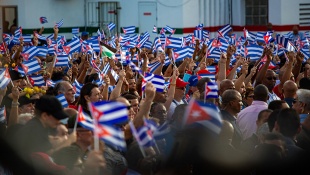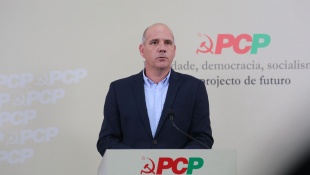1. The Trump administration's decision to impose a formidable increase in customs tariffs is an unprecedented act of economic coercion on the rest of the world.
A decision which is not the result of any ignorant or hasty analysis but is part of an attempt to ensure dominance and to halt and reverse the relative economic decline of the US, in an international context in which the balance of power is changing profoundly. Taking advantage of its dominance of international financial institutions and its military power, the US is trying to change the rules it has itself established, trying to impose its interests, in an attitude where the US, in Trump's words, assumes the ‘driving seat’ of the world, even if it doesn't spare its allies and exposes itself to risks. A decision that portrays the growing difficulties faced by the US economy, particularly in terms of the exponential growth of its debt, and is inseparable from the strategy of confrontation that is underway, and which has the People's Republic of China as its favourite target.
2. The scale of what has been decided and its implications, as well as the countermeasures that have already been announced and others that may follow, make future developments unpredictable. This doesn't mean that considerable impacts can't be anticipated, especially in countries that are more exposed to trade with the US: economic downturns and recessions; interruptions in the value chains of many goods; outbreaks of inflation; closure of companies. Impacts that will also depend on each country taking a more or less assertive stance in defence of its interests and not giving in to US pressure.
3. Once again it is confirmed that the right-wing policy, the policy of successive PS and PSD-CDS governments of submission to the impositions of the US and the EU, of devaluation of productive capacity and external dependence, not only increases the Country's vulnerability, but is incapable of responding to situations like this.
In a context in which the US is the fourth largest destination for our exports - wines, cork, medicines, fuel, paper, machinery, etc - and in which other countries with which Portugal has relations are also affected, it is essential, as the PCP has long argued, to diversify the Country's trade relations on a mutually advantageous basis. It is necessary to have a policy to replace imports with domestic production - food, medicines, equipment, etc - and to valorise the domestic market, which requires improving wages, increasing purchasing power and supporting MSMEs. The recovery of public control of strategic sectors, such as energy and banking, becomes even more topical in this context, as does the aim of ensuring the Country's food and energy sovereignty.
Portugal must also intervene in the European Union and other international forums to put an end to the enslavement to the US and the policy of confrontation and sanctions that has been increasing. It is essential to ensure that the EU responds to the problems of its member countries and that it is not driven by the interests of the major powers, such as Germany and France, reversing the militaristic drift and the diversion of resources to the arms race.
4. More than ever, faced with developments in the world and the need to defend the interests of the Portuguese workers and people, the Country needs a policy that, within a framework of cooperation with other countries, places development, sovereignty and national independence at the centre of its action.



